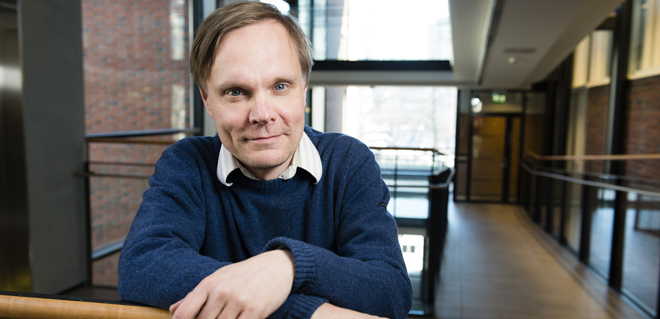Researcher introduction: research professor Tuomas Pekkarinen

We interviewed Tuomas Pekkarinen for our researcher introduction series. Read the text below to see what Tuomas is working on.

Please introduce yourself
I’m Tuomas Pekkarinen, a research professor and research leader here at VATT. I’m a labor economist and my area of responsibility is labor market and education research. My road to VATT could be described as a battle of attrition. I was a post-doc researcher for nine years if you include my time as an Academy of Finland doctoral researcher. I concluded that VATT was the most sensible option for me to continue doing the type of research I did in the academic world.
What kind of research are you currently working on?
The themes of my research are labor markets and education. In the case of education, I’m interested in the effects of education policies. I want to find out how education can be used to promote equality of opportunity and in a certain way give people from a disadvantaged position the opportunity for better lifetime incomes. At the moment, I am working on the effects of choices in the joint phase of secondary education.
What do you mean by the joint phase of secondary education?
In Finland we have an education system, where after a very uniform primary school, young people must choose between vocational education and upper secondary education, and between the various options within these categories.
How challenging is this joint phase for young people?
This is the first big choice that people make regarding their education, and it has far reaching consequences. The choice is critical for the young person’s future, and it looks like some young people are not very well prepared to make that choice. The support structures in place to help young people make these choices have also not worked like we would want them to. It must be said that interesting changes have been happening lately. For example, compulsory education was expanded last year so that it exceeds this joint phase. It is interesting to examine how this change affects the success of education transitions.
How can we study the effects of the choices made in these joint phases?
For example, we have studied the impacts of not being accepted to any place of study, which happens to about 5 % of the age class every year. Among other things, we looked at the impact on final education level and crime, and it seems that being left out at the first search for a place of study greatly increases the risk of social exclusion and marginalization. We have also studied the effects of being accepted to upper secondary education on the skills evaluated in the basic tests of the Finnish Defense Force.
Which research projects will you be working on next?
I have a long-term research project in mind, which I would like to complete before I retire. It has to do with an earlier study where they looked at the personality characteristics of Finnish conscripts which are assessed in the Finnish Defence Forces P2-test. The study showed that in the span of 20 age cohorts these personality characteristics had changed in an essential way. If you want to exaggerate a little, you could say that the Finnish men born in 1979 are completely different than those born in 1962.
Specifically, those personality characteristics that are rewarded in the labor market have become more common or strengthened in the Finnish male population. A similar phenomenon has been documented in Finland and in international research regarding cognitive abilities, which have also followed the trend and gotten better in the human population.
I would like to find out the cause of these two phenomena because this is a very fundamental shift in the preconditions under which young people will transition to upper education and ultimately to the job market. We don’t have, in Finnish or international research, any evidence to suggest what might be the cause behind these trends. I’m especially interested to find out how much education policy has impacted these trends.
Which question on economics would you like to answer to right now and why this particular question?
I would say that figuring out the causes behind the differences in peoples lifetime incomes is the kind of fundamental question my research and my colleagues research is looking to answer. I want to know why peoples earning capacity differs so much and what public policy we could use to make sure that this earning capacity would as non-reliant as possible on family background. Above all I want to know what type of education policy would give everyone the best possible preconditions to thrive in the labor market.
Tuomas Pekkarinen
Blog
Blogit
Education
Labour markets
Labour markets and education

